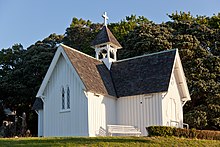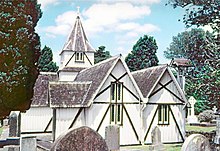The Selwyn churches were a group of 19th-century Anglican churches and chapels in the Auckland region, New Zealand, named after Bishop Selwyn, who inspired their construction. The majority were built in wood in the neo-gothic style, and many were designed by the architect Frederick Thatcher.[1]


Two Selwyn churches, St Bride's Church in Mauku and the Holy Trinity in Otahuhu were designed by Arthur Guyon Purchas, an associate of the Bishop Selwyn.[2]
Most Selwyn churches were constructed from local timber, mainly kauri and totara. Earlier churches were simple with a rectangular nave, and a smaller chancel; larger churches containing a spire and smaller ones having a belfry; internal walls were stained and varnished; Tudor style oriel windows were used in some. Examples of these include: All Saints Church, Howick, St Peter's Anglican Church, Onehunga, and St Matthias' Church, Panmure.[3]: 24
In 1930 two architecture students recorded and surveyed some of the more well-known Selwyn churches.[3]: 7
Selwyn churches in the Auckland region:[4]
- St Stephen's, Judges Bay (1844) – first St Stephen's chapel
- St Andrew's, Epsom (1846–67)[5]
- St Thomas's, Tamaki (1847)[6]
- St John's Chapel, Meadowbank[7]
- All Saints, Howick (1847)[8]
- St Mark's, Remuera (1847–60)[9]
- St Peter's, Onehunga (1848)
- St Barnabas, Mt Eden (1848)[10]
- St Barnabas, Parnell (1848)[11]
- St James' Church, Okahu (c.1850)[3]: 24
- St Matthias', Panmure (1852)[12]
- Old St Mary's, Parnell (1855–58) – replaced by St Mary's Cathedral
- St Stephen's Chapel, Judges Bay (1857)[13]
- St James', Māngere Bridge (1857) – the only stone church[14]
- St John the Baptist, Northcote (1860)[15]
- St Bride's, Mauku (1860–61)[16]
- All Souls', Clevedon (1861)[17]
- Christ Church, Papakura (1862)[18]
- St John's, Drury (1862)[19]
- Holy Trinity, Otahuhu (1863) – moved in 1928 to become Selwyn Church, Mangere East[20]
- St Sepulchre's, Eden Valley (1865–91)[21]
- St Peter's in the Forest, Bombay (1867)[22]
References
edit- ^ Haworth, Jennifer (May 1995). "The Selwyn churches". Heritage New Zealand. 53: 25–27.
- ^ Limbrick, Warren (April 2011). "Saint Bride's Church, Mauku: A Frontier Church in the Midst of Conflict" (PDF). Anglican Historical Society newsletter (46). The Anglican Historical Society of New Zealand.
- ^ a b c Knight, Cyril Roy (1972). The Selwyn churches of Auckland. Reed.
- ^ Knight, Cyril Roy. (1972). The Selwyn churches of Auckland. Wellington [N.Z.]: A.H. & A.W. Reed. ISBN 0-589-00705-X. OCLC 596619.
- ^ "St Andrew's Church (Anglican)". New Zealand Heritage List/Rārangi Kōrero. Heritage New Zealand. Retrieved 27 January 2021.
- ^ "St. Thomas' Church (Kohimarama, Auckland, N.Z.)". National Library of New Zealand. Archived from the original on 2 February 2021. Retrieved 28 January 2021.
- ^ "Chapel of St John the Evangelist". New Zealand Heritage List/Rārangi Kōrero. Heritage New Zealand. Retrieved 27 January 2021.
- ^ "Old All Saints Church (Anglican)". New Zealand Heritage List/Rārangi Kōrero. Heritage New Zealand. Retrieved 27 January 2021.
- ^ "St Mark's Church (Anglican)". New Zealand Heritage List/Rārangi Kōrero. Heritage New Zealand. Retrieved 27 January 2021.
- ^ "St Barnabas' Church (Anglican)". New Zealand Heritage List/Rārangi Kōrero. Heritage New Zealand. Retrieved 27 January 2021.
- ^ "St Barnabas' Chapel". New Zealand Heritage List/Rārangi Kōrero. Heritage New Zealand. Retrieved 27 January 2021.
- ^ "St Matthias' Church (Anglican)". New Zealand Heritage List/Rārangi Kōrero. Heritage New Zealand. Retrieved 27 January 2021.
- ^ "St Stephen's Chapel (Anglican) and Churchyard". New Zealand Heritage List/Rārangi Kōrero. Heritage New Zealand. Retrieved 27 January 2021.
- ^ "St James' Church (Anglican)". New Zealand Heritage List/Rārangi Kōrero. Heritage New Zealand. Retrieved 27 January 2021.
- ^ Robinson, Michelle (11 March 2010). "Shore's oldest church nears 150". Stuff. Archived from the original on 5 February 2021. Retrieved 26 January 2021.
- ^ "St Bride's Church (Anglican)". New Zealand Heritage List/Rārangi Kōrero. Heritage New Zealand. Retrieved 27 January 2021.
- ^ "St Souls' Church (Anglican)". New Zealand Heritage List/Rārangi Kōrero. Heritage New Zealand. Retrieved 27 January 2021.
- ^ "Selwyn Chapel (Anglican)". New Zealand Heritage List/Rārangi Kōrero. Heritage New Zealand. Retrieved 27 January 2021.
- ^ "St John's Church (Anglican)". New Zealand Heritage List/Rārangi Kōrero. Heritage New Zealand. Retrieved 27 January 2021.
- ^ "Selwyn Church (Anglican)". New Zealand Heritage List/Rārangi Kōrero. Heritage New Zealand. Retrieved 27 January 2021.
- ^ "Church of the Holy Sepulchre and Hall". New Zealand Heritage List/Rārangi Kōrero. Heritage New Zealand. Retrieved 27 January 2021.
- ^ "Church of St Peter in the Forest (Anglican)". New Zealand Heritage List/Rārangi Kōrero. Heritage New Zealand. Retrieved 27 January 2021.